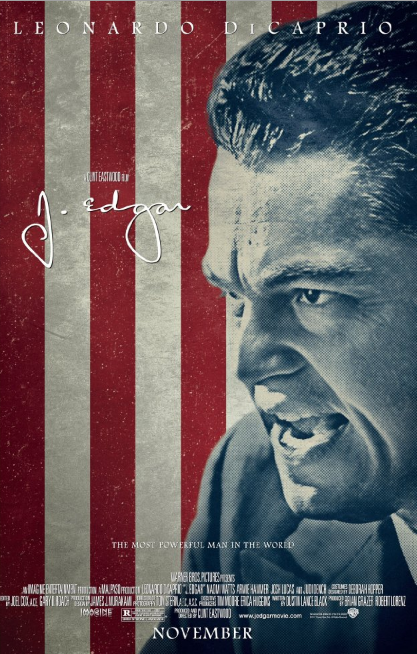Print Edition: November 16, 2011
 Clint Eastwood has shown he can direct movies that grab the attention of audiences and make them care about historical events and characters on the screen. Letters from Iwo Jima and Flags of Our Fathers are just two examples of his directorial abilities. His new movie J. Edgar stars Leonardo DiCaprio as J. Edgar Hoover, the man who ran the FBI for 48 years. The movie follows Hoover, from his early days at the then Bureau of Investigation through to his death in 1972, as one of the most powerful men in the United States.
Clint Eastwood has shown he can direct movies that grab the attention of audiences and make them care about historical events and characters on the screen. Letters from Iwo Jima and Flags of Our Fathers are just two examples of his directorial abilities. His new movie J. Edgar stars Leonardo DiCaprio as J. Edgar Hoover, the man who ran the FBI for 48 years. The movie follows Hoover, from his early days at the then Bureau of Investigation through to his death in 1972, as one of the most powerful men in the United States.
Much of the movie is told through scenes of Hoover dictating his memoirs to a string of junior FBI agents. His words act as a gateway to flashbacks of the events of Hoover’s life – as Hoover wanted them remembered. The movie is constantly jumping between the 1970s and the earlier periods of Hoover’s FBI experiences. While the flashbacks allow the audience to witness the events from the past, it becomes increasingly muddled as to what is truth, what is the revisionist spin Hoover would like to project for posterity, and what is the real present day (1970s) events.
The movie covers Hoover’s strong attachment to his domineering mother, his secret homosexuality, his close relationship with Clyde Tolson and the actions Hoover took to make the FBI arguably the most powerful law enforcement agency in the United States.
Leonardo DiCaprio is no doubt a good actor. Unfortunately his portrayal of Hoover is not likely to be considered among his best roles. The screenplay by Dustin Lance Black depicts Hoover as a comic book caricature, a buffoon, a scared man, a dangerous man, a conflicted lover and a sad and tragic figure. DiCaprio isn’t given enough time in any of the incarnations to make them appear convincing. Hoover in real life was physically a homely man, while DiCaprio clearly is not. This difference only helps to distance the actor’s portrayal and believability from the real Hoover.
The movie has a strong supporting cast with Judi Dench as Hoover’s mother, Naomi Watts as Hoover’s confidential secretary and Armie Hammer as Hoover’s confidant and love interest Clyde Tolson. Hammer’s understated portrayal of Tolson as the loyal long-suffering partner to Hoover is one of the highlights of the film.
As the movie spans decades in the life of Hoover, the characters, of course, must age. Much of this aging is accomplished by the use of aging make up and prosthetics with varying degrees of success. Naomi Watts’ aging makes her convincingly appear older. But Armie Hammer’s aging effects result in him looking like someone who has had a cheap old man mask applied to his face and, for added effect, been injected with an overdose of Botox to stop any movement of his facial muscles. Leonardo DiCaprio’s aging is much better than Hammer’s but results in him looking more like an older Jon Voight than J.Edgar Hoover.
Director Eastwood employs a visual effect that helps create a sense of distant events; during the flashback scenes the colour on the screen is subdued and has a sepia quality to it.
There are interesting events in this film. The kidnapping of the Lindbergh baby and the subsequent trial of Bruno Richard Hauptmann for the crime are covered in detail and used to demonstrate the role Hoover had in the promotion of the use of forensic science in crime solving.
However, Eastwood’s J. Edgar faces a dilemma. Those who remember Hoover will likely be disappointed with the scattered approach to the way Hoover’s life is presented. With 40 years having passed since Hoover’s death, many of the movie-going public will have no knowledge of the real Hoover. So with no idea who he was and not enough to be memorable in Eastwood’s production, why would they spend their money to see it?


